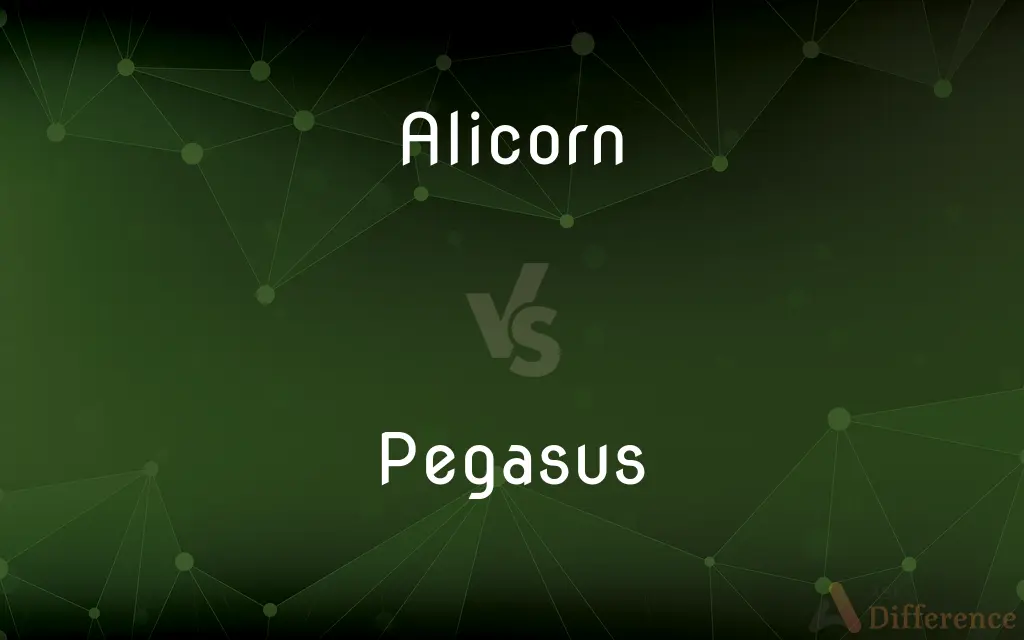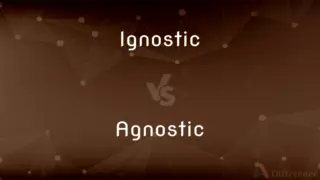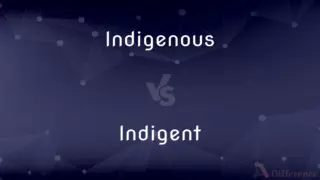Alicorn vs. Pegasus — What's the Difference?
By Maham Liaqat & Urooj Arif — Updated on April 21, 2024
Alicorn is a mythical creature with both wings and a horn, often symbolizing purity and magic, whereas Pegasus strictly refers to a winged horse from Greek mythology, known for its role in heroic deeds.

Difference Between Alicorn and Pegasus
Table of Contents
ADVERTISEMENT
Key Differences
An alicorn combines the features of a unicorn and a Pegasus, possessing a single horn and wings, making it a symbol of ultimate fantasy and rarity. On the other hand, a Pegasus is specifically a winged horse without any horns, deeply rooted in Greek myth as the child of Poseidon and the Gorgon Medusa.
Alicorns are often depicted in modern fantasy literature and media as creatures of high magic, associated with themes of healing and enchantment. In contrast, the Pegasus has classical ties to heroism and adventure, famously helping heroes like Bellerophon in their quests.
In terms of cultural significance, alicorns appear mostly in contemporary settings, often in children's literature and animated films, serving as figures of beauty and magical prowess. Meanwhile, the Pegasus is a staple in ancient stories and artworks, symbolizing freedom and inspiration, often depicted in battle scenes and monumental art.
The concept of the alicorn is a relatively recent development in mythical lore, emerging from the combination of unicorn and Pegasus myths to create an all-encompassing magical creature. Whereas, Pegasus has been a part of ancient Greek mythology since antiquity, offering a rich historical and cultural context.
Alicorns, while popular in modern fantasy, are not traditionally part of any ancient folklore; their stories are shaped by contemporary values and aesthetics. On the other hand, Pegasus features in numerous mythological stories, each enriching the character's legacy within Greek mythology.
ADVERTISEMENT
Comparison Chart
Horn
Has a single horn
No horn
Wings
Has wings
Has wings
Origin
Modern fantasy creation
Ancient Greek mythology
Symbolism
Magic, purity, enchantment
Heroism, freedom, inspiration
Cultural Role
Featured in modern media and literature
Part of classical mythology
Compare with Definitions
Alicorn
A mythical creature with wings and a unicorn's horn.
The alicorn glided over the enchanted forest, spreading magic wherever it went.
Pegasus
A winged horse from Greek mythology.
Pegasus soared through the skies of ancient Greece, inspiring many myths.
Alicorn
A symbol of magical or healing power in fantasy contexts.
In the tale, the alicorn's horn could purify water and heal the sick.
Pegasus
Associated with heroic adventures and battles.
Pegasus was a companion to heroes, participating in numerous epic battles.
Alicorn
A relatively modern addition to mythical creature lore.
The concept of the alicorn is not found in traditional mythology but has become popular in recent years.
Pegasus
Born from the blood of Medusa when Perseus beheaded her.
The birth of Pegasus was one of Greek mythology's most miraculous events.
Alicorn
Associated with virtues of purity and enchantment.
The alicorn in the story represented the purest form of magic in the kingdom.
Pegasus
Often a symbol of poetic inspiration and freedom.
The poet called upon Pegasus to inspire his verses.
Alicorn
Often depicted in children's books and animations.
The animated series featured an alicorn as its lead character, beloved by many young viewers.
Pegasus
Depicted in various artworks and stories throughout history.
Ancient sculptures and paintings frequently portray Pegasus, emphasizing its importance in art and culture.
Alicorn
The horn of a unicorn considered as a medical or pharmacological ingredient.
Pegasus
Pegasus (Greek: Πήγασος, Pḗgasos; Latin: Pegasus, Pegasos) is a mythical winged divine horse, and one of the most recognized creatures in Greek mythology. Usually depicted as pure white, Pegasus is the offspring of the Olympian god Poseidon.
Alicorn
(nonstandard) A mythological creature, a mixture of pegasus and unicorn: a winged horse with a single horn on its head.
Pegasus
Greek Mythology A winged horse that with a stroke of his hoof caused the fountain Hippocrene to spring forth from Mount Helicon.
Pegasus
A constellation in the Northern Hemisphere near Aquarius and Andromeda.
Pegasus
A winged horse (imaginary or mythical, sometimes figurative).
Pegasus
A winged horse fabled to have sprung from the body of Medusa when she was slain. He is noted for causing, with a blow of his hoof, Hippocrene, the inspiring fountain of the Muses, to spring from Mount Helicon. On this account he is, in modern times, associated with the Muses, and with ideas of poetic inspiration.
Each spurs his jaded Pegasus apace.
Pegasus
A northen constellation near the vernal equinoctial point. Its three brightest stars, with the brightest star of Andromeda, form the square of Pegasus.
Pegasus
A genus of small fishes, having large pectoral fins, and the body covered with hard, bony plates. Several species are known from the East Indies and China.
Pegasus
A constellation in the northern hemisphere near Andromeda and Pisces
Common Curiosities
How does a Pegasus differ from other mythical horses?
Pegasus is unique among mythical horses for having wings, allowing it to fly.
Are alicorns considered more powerful than Pegasuses?
In most fantasy depictions, alicorns are portrayed as possessing greater magical powers than Pegasuses, due to their combined attributes.
Do alicorns have any special powers?
In fantasy, alicorns often have magical powers, including healing and purification.
What is an alicorn?
An alicorn is a fictional creature that has both wings and a unicorn’s horn.
What role does Pegasus play in Greek mythology?
Pegasus is involved in several Greek myths, primarily known for helping hero Bellerophon defeat the Chimera.
Who created Pegasus in mythology?
Pegasus was born from the blood of Medusa in Greek mythology.
What historical artworks feature Pegasus?
Pegasus appears in numerous ancient Greek sculptures and pottery designs.
Are alicorns part of ancient mythology?
No, alicorns are not found in ancient mythology; they are a modern creation combining elements of unicorns and Pegasuses.
Is there a specific story that introduces the alicorn?
Alicorns don’t originate from a specific myth but are common in contemporary fantasy narratives.
What is the main difference between an alicorn and a Pegasus?
The main difference is that alicorns have a unicorn's horn and wings, whereas Pegasuses only have wings.
Can alicorns fly like Pegasuses?
Yes, alicorns can fly thanks to their wings, similar to Pegasuses.
Where do alicorns commonly appear?
Alicorns are prevalent in modern media, particularly in children's books and animated films.
What does Pegasus symbolize in literature?
Pegasus often symbolizes freedom and the soaring spirit of inspiration in poetry and art.
Why is Pegasus important in Greek mythology?
Pegasus is important for its symbolic connection to divine inspiration and its role in several key myths.
How are alicorns and Pegasuses typically portrayed in stories?
Alicorns are usually depicted as benevolent and magical, while Pegasuses are portrayed as noble creatures involved in epic quests.
Share Your Discovery

Previous Comparison
Ignostic vs. Agnostic
Next Comparison
Indigenous vs. IndigentAuthor Spotlight
Written by
Maham LiaqatCo-written by
Urooj ArifUrooj is a skilled content writer at Ask Difference, known for her exceptional ability to simplify complex topics into engaging and informative content. With a passion for research and a flair for clear, concise writing, she consistently delivers articles that resonate with our diverse audience.














































